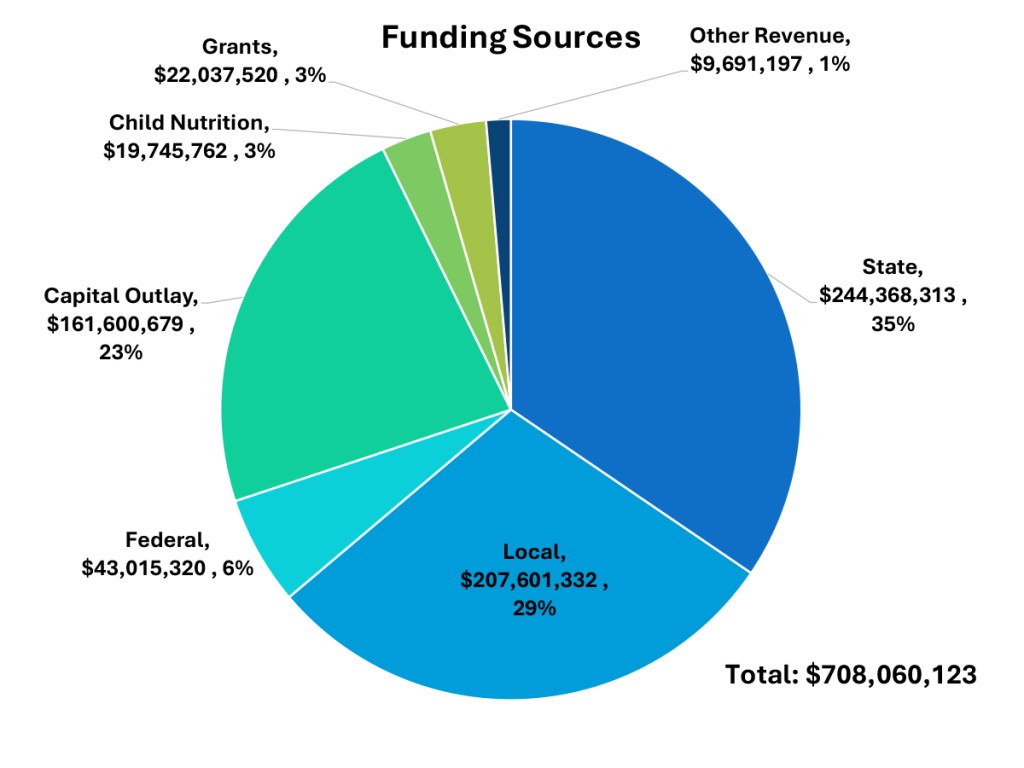It’s officially budget season at Durham Public Schools (DPS). Last week, Superintendent Anthony Lewis unveiled his first budget draft, which lays out rough amounts and priorities before he and the school board decide on final line item amounts to ask the county commission to fund.
Here are seven questions you might be asking about the DPS budget as the draft inches toward a June county commission vote.
How much money does DPS get from the county?
The 2024–25 DPS budget totaled about $700 million. Of that $700 million, the county provided about 50 percent through direct funding (30 percent) and capital outlay (20 percent, largely funded by bonds). The budget included a historic increase in funding, giving the schools $27 million more from the county. At the time, the county government worried about the sustainability of such an increase, and in February warned DPS administration to “restrain” their expectations this year.
The superintendent’s budget this year asks for a perhaps more palatable $16 million increase over last year.
How may federal cuts impact DPS?
The short answer: no one knows the full effect, but the district is already losing out on some funds thanks to President Trump’s orders.
Trump recently signed an executive order to all but dismantle the federal Department of Education. The department, as far as K-12 schools are concerned, mainly funnels money to districts through programs under Title I and IDEA (the Individuals with Disabilities Education Act). In 2024–25, the district received about $43 million, or 6 percent of its overall funding, from the federal government.

At the board’s March 27 meeting, Lewis said DPS is also losing out on DREAM grant funding, which funded a collaboration with UNC-Chapel Hill “to recruit and train teachers from underrepresented groups to work in high-needs schools.” The $4.8 million program was just a piece of the $600 million cut to similar programs (INDY has recently reported on how that cut is already hitting neighboring Wake County).
How will the district support its bus drivers?
The district is still dealing with a prolonged transportation crisis caused by a bus driver shortage. The budget draft includes $377,436 to provide each driver with a $200 monthly local supplement. In light of the series of school cancellations due to snow this year, Chief Financial Officer Jeremy Teetor said that such a supplement could help drivers have some stream of income even if weather prevents them from working.
Board member Natalie Beyer asked how much it would cost the district to raise the bus driver starting salary to $20 an hour (Teetor said that he would have more information for the April 11 work session about the possible pay compression impact of that increase). Driver starting salary is currently $18.86 an hour, which Beyer has previously compared to GoTriangle’s $20.64. DPS drivers also only usually work for 10 months a year.
What’s up with that $7 million shortfall?
DPS actually had a roughly $34 million shortfall for the 2024–25 budget, as Teetor announced in January. There was no one single reason for the gap between the expected and actual expenditures this year, as the district spent more than expected on payroll, charter schools, child nutrition, and several other areas. Lewis’s interim predecessor, Catty Moore, had already recommended withholding 15 percent from the operating budget, which reduced the shortfall to about $7 million. In February, the district announced plans to use some of philanthropist MacKenzie Scott’s 2022 $18 million donation to fill most of that hole.
At the recent meeting, Teetor told board members that he expects to maintain the levels set by that 15 percent cut for both school and central department budgets. The district has also announced a temporary hiring freeze (excluding bus drivers and exceptional children staff).
The district is also going through its annual allotment process, which is a routine look at every school’s enrollment and current/projected course registration numbers. In neighboring Chapel Hill, that process led to outcry last month when the district told some teachers that they wouldn’t have their contracts renewed.
How much money do charter schools take from DPS?
The superintendent’s budget draft would increase funding for charter schools by $2 million. That’s due to a North Carolina law that requires local districts to transfer “an amount equal to the per pupil share” of public school funding to charter schools (i.e., the dollars follow the student). Teetor said that added up to about $43 million of local taxpayer money passed through DPS to charter schools in the 2024–25 budget, as the county has over 8,200 students enrolled in charter schools.
“Any new revenue we get, we must share with them from our local funds,” said Teetor.
What’s next for the budget?
On April 9, the board will hold a public hearing to get community feedback. After that meeting, the board will meet publicly with the Durham Association of Educators, the majority union currently hammering out a recognition agreement with the superintendent. Many of the DAE’s stated priorities are budget focused, including classified pay compression, full restoration of master’s pay, extra pay for extra duties, and a multiyear plan for certified supplement and classified pay increases.
The board will then parse the budget on April 10 before a final vote, currently set for April 24, to send the request to the county commission.
You can check out a full first draft of the budget proposal here.
Bonus: How much does a tuba cost?
The budget lists onetime costs including two concert tubas at $10,000 each.
Support independent local journalism. Join the INDY Press Club to help us keep fearless watchdog reporting and essential arts and culture coverage viable in the Triangle.
Reach Reporter Chase Pellegrini de Paur at [email protected]. Comment on this story at [email protected].
